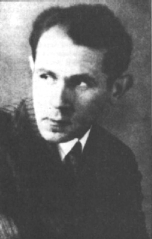IL SECONDO AUTUNNO - OMAGGIO A BRUNO SCHULZ
per ensemble / for ensemble (2015)
dedicato a / dedicated to: "Ensemble Prometeo" - Italy
EDIZIONI SUVINI ZERBONI - MILANO
 audio integrale
audio integrale
 pages 1 - 3
pages 1 - 3

Questo secondo autunno della nostra provincia non è altro che un miraggio malato, proiettato in dimensioni ingigantite nel nostro cielo dalla bellezza morente, chiusa nei nostri musei. Questo autunno è un grande teatro ambulante che inganna con la poesia, un'immensa cipolla variopinta che si sfoglia, un velo dopo l'altro, in un panorama sempre nuovo. Mai si raggiunge il fondo.
Regna il caos, e ognuno tira le corde del sipario, e il cielo, il grande cielo d'autunno, appare negli squarci dei fondali e risuona tutto del cigolio delle carrucole. E al di sopra di tutto questo, una fretta febbrile, un carnevale in ritardo e senza fiato, un panico da sala da ballo innanzi l'alba, una torre di Babele di maschere che non riescono a trovare i loro abiti veri.
Visionario, ironico, tessitore di metamorfosi e di creazioni infinite, malinconico falsario. Queste e molte altre sono le definizioni che si possono dare a Bruno Schulz, scrittore polacco la cui grandezza è pari all'esiguità degli scritti lasciatici dalla sua tragica esistenza.
Le profonde suggestioni provenienti dalle sue pagine - ed in particolare dal breve Il secondo autunno, dal quale sono tratte le precedenti righe - si condensano nel mio lavoro.
Nessuna volontà descrittiva di alcunché, quanto, come riconoscente tributo, la presenza di alcuni percorsi narrativi e figurali derivati metaforicamente dalle pagine di Schulz: la ripresentazione ciclica e apparentemente priva di direzione di immagini simili, attiva sia a livello di singole figure sia di interi episodi (le prime due sezioni vengono immediatamente riproposte, con proporzioni variate e con nuove digressioni), l'evoluzione sempre più caotica e scompostamente paradossale, testimoniata in particolare dal penultimo episodio, aperto dall'esitante proporsi del clarinetto attorno ad un singolo suono, che viene portato gradualmente a diventare una ridda di glissati acuti, non molto dissimile dalle proliferazioni di uccelli strepitanti evocate nella soffitta dalla demiurgica figura del Padre Schulziano; ancora, le pietre che tagliano lo scorrere di un tempo distorto con la loro scansione inerte e meccanica o, infine, la voluta enfasi degli accordi in fortissimo all'approssimarsi della fine del brano, incapaci di raggiungere la conclusione svuotandosi presto di forza, a mostrare dietro all'uniforme seriosamente luminosa la stoppa, la paglia e la cartapesta del fantoccio.
That second autumn of our province is nothing but a sick mirage projected through an expanse of radiation into our sky by the dying, shut-in beauty in our museums. Autumn is a great touring show, poetically deceptive, an enormous purple-skinned onion disclosing ever new panoramas under each of its skins. No center can ever be reached. There is great confusion: everybody is pulling at the curtain ropes and the sky, a great autumnal sky, hangs in tatters and is filled with the screeching of pulleys. And above all this there is an atmosphere of feverish haste, of belated and breathless carnival, a panic in a ballroom at dawn, a tower of Babel of masked people who cannot find their real clothes.
Visionary, ironic, weaver of metamorphoses and infinite creations, melancholy falsifier. These and many others are the definitions that one can give to Bruno Schulz, a Polish writer whose greatness is equal to the extent of the paltriness of the writings he left us from his tragic existence.
The deep sentiments coming from his pages (and in particular from the short Il secondo autunno, from which the previous lines were taken) are condensed in my work. There is no intention, except, as a heartfelt tribute, the presence of some narrative and figural elements derived metaphorically from the pages of Schulz: the cyclic and seemingly directionless representation of similar images, enacted both at the level of single figures and entire episodes (the first two sections are immediately repeated, with varied proportions and new digressions), the increasingly chaotic and untidily paradoxical evolution, testified in particular by the penultimate episode, opened by the hesitant gesture of the clarinet around a single note, that gradually evolves into a jumble of high glissandos, not so different from the proliferations of screaming birds evoked in the attic of the demiurgic figure of Schulz's Father; and again, the stones that cut the running of a distorted time with their inert and mechanical scansion or, finally, the deliberate emphasis of the fortissimo chords towards the end of the piece, incapable of reaching the conclusion and soon devoid of strength, revealing behind the excessively bright uniform the stuffing, the straw and the papier-mâché of the puppet.
